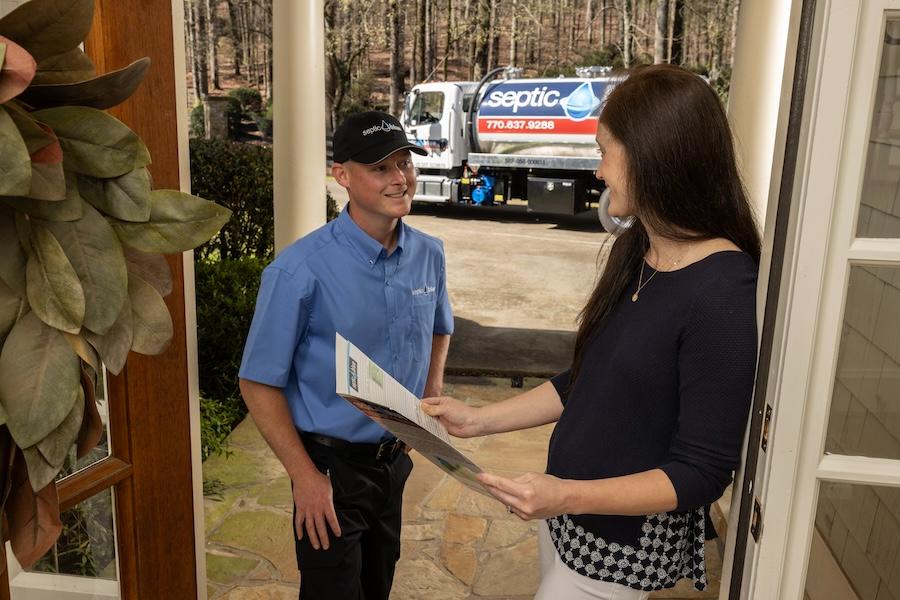Menu
"WE NOT ONLY PUMP YOUR TANK - WE CLEAN IT!"
WE NOT ONLY PUMP YOUR TANK - WE CLEAN IT! Free Septic System Inspection ($99 Value)
Free enzyme treatment - Financing Available
"WE NOT ONLY PUMP YOUR TANK - WE CLEAN IT!"
WE NOT ONLY PUMP YOUR TANK - WE CLEAN IT! Free Septic System Inspection ($99 Value)
Free enzyme treatment - Financing Available
Homeowners often conduct DIY septic tank repair and maintenance to manage their wastewater treatment system. One aspect of septic care that usually raises concerns is additives. These products frequently provide temporary solutions to enhance efficiency, reduce odors, and prevent backups. If you want a more hands-on approach to septic maintenance, consult the Septic Blue of Lakeland professionals. If you are wondering how effective additives are, here's a closer look at whether you should incorporate these products during DIY septic tank cleaning jobs.
 May 26, 2024
May 26, 2024
Septic additives are substances introduced into the system to improve its performance. There are two main types: biological and chemical. Biological additives contain bacteria and enzymes that break down organic matter, while chemical additives include acids and alkalis that dissolve solids and grease. Understanding the types and their intended functions is the first step in determining their necessity and preventing unnecessary septic tank repair costs.
Owning a home comes with…
Before undertaking a DIY septic maintenance project, it is vital to understand the pros and cons of using additives. The last thing you want is excessive use and subsequent problems like frequent septic tank pumping and repair sessions. Let's look at the benefits and drawbacks of septic additives.
The main advantage of biological additives is that they help replenish the bacteria in the septic tank, which is essential for breaking down solid waste. With time, certain household chemicals and cleaning products can reduce the bacterial population, causing inefficient waste digestion. Adding beneficial bacteria and enzymes can restore the balance and improve the tank's overall function.
A common downside of additives is their questionable effectiveness. Many studies and experts suggest that a well-maintained septic system doesn't need additional bacteria or enzymes. The natural bacterial process is usually sufficient to break down waste if the system is properly maintained through regular septic tank pumping and mindful usage.
Unlike biological additives, chemical additives can cause more harm than good. Strong acids and alkalis might break down solids, but they can also corrode pipes and other components of the septic system. System failure can cause severe damage and premature septic tank installation projects. Even some biological additives may disrupt the natural bacterial balance, leading to more problems than solutions.
Consult a trusted septic company for viable alternatives if you prefer a more proactive approach to septic tank repair and maintenance. Here are safer and more effective solutions to consider over septic additives.
Regular septic tank cleaning and pumping are the most effective ways to maintain a healthy system. Depending on the size of your tank and household usage, this should be done every three to five years. Pumping removes the accumulated solids, preventing backups and ensuring the system operates efficiently.
Another crucial aspect of septic maintenance is being mindful of what goes down your drains. Avoid flushing non-biodegradable items, excessive grease, and harsh chemicals, as these can disrupt the bacterial balance and clog the system. Using septic-safe products for cleaning and personal care can maintain system health and mitigate emergency septic tank installation projects.
While septic tank additives are solutions for maintaining and improving septic system performance, their effectiveness is debatable. Contact Septic Blue of Lakeland and schedule a consultation to ensure your unit's longevity and efficiency without the potential risks associated with additives. As a reputable septic company, our experts can inspect, diagnose, and address the problem, restoring function and durability.